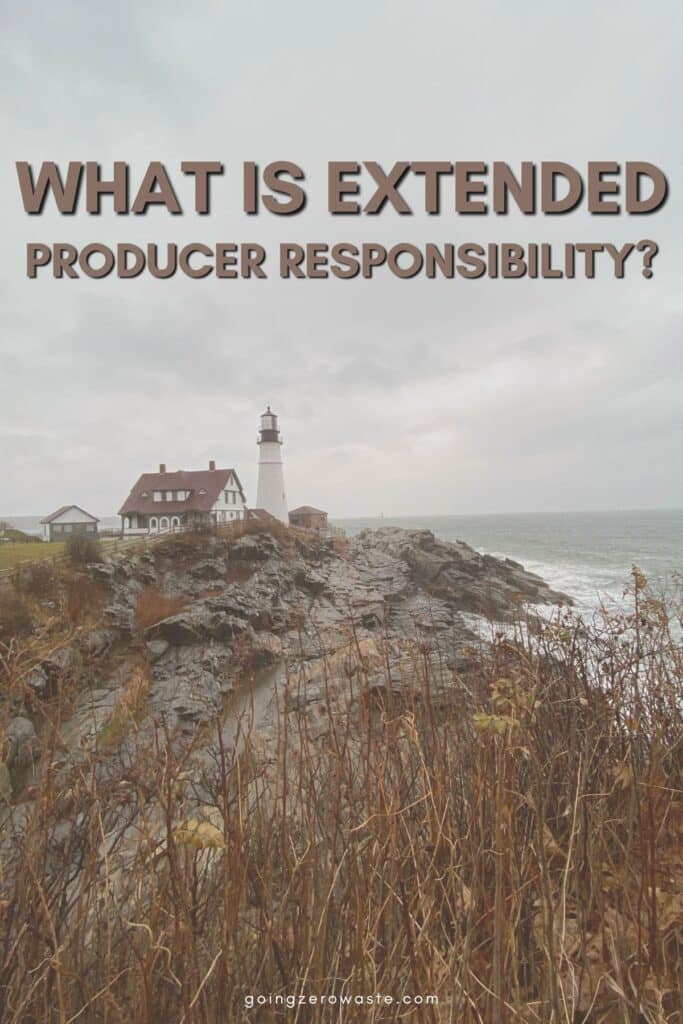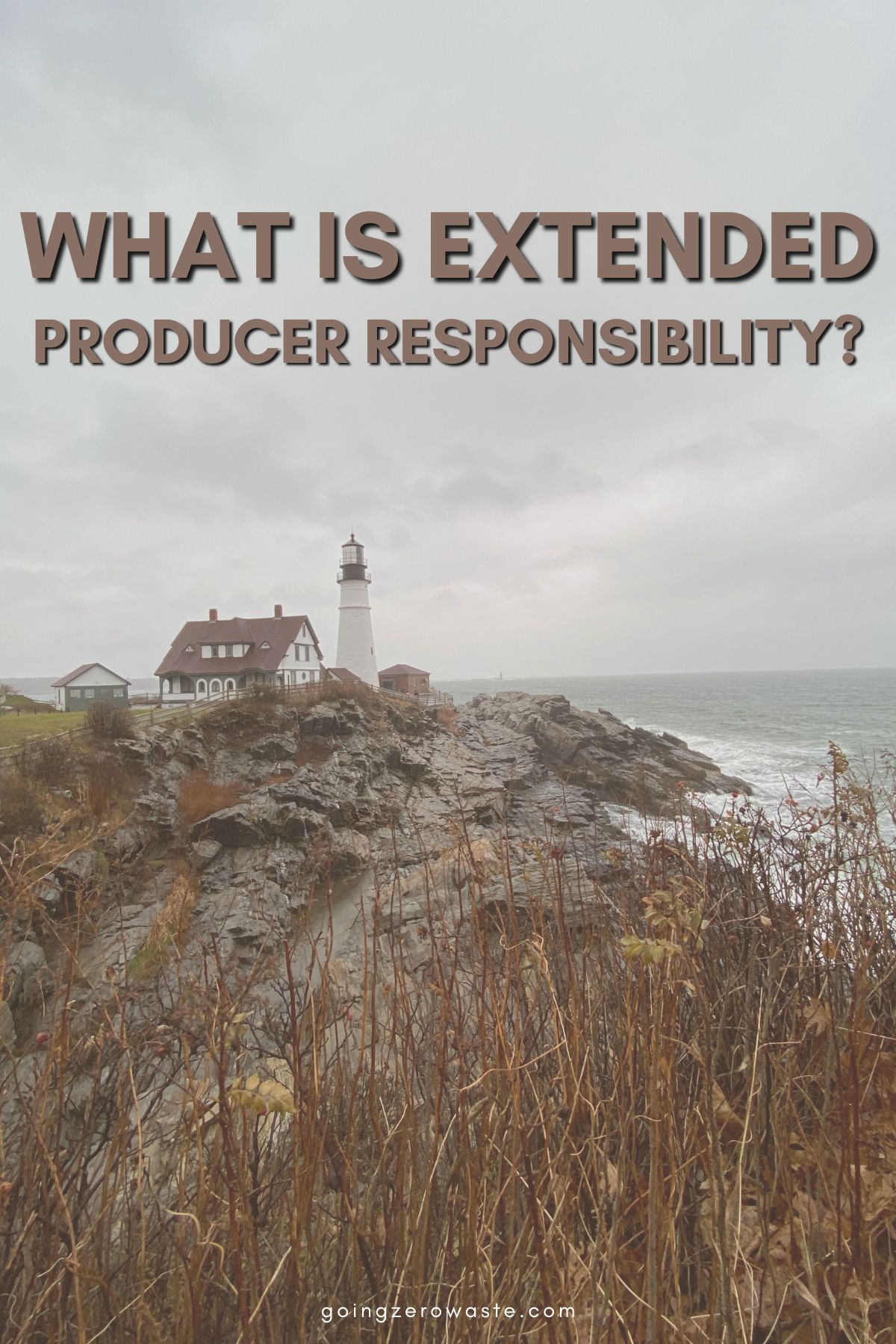[ad_1]
Last Updated on April 1, 2023
When you buy a product, do you want the packaging, or what’s inside the package? Not sure about you but when I buy a bag of chips – I want the chips, not the plastic bag.
So why do we pay for packaging, pay to get rid of it, and then if/when it winds up in our environment, pay with our tax dollars to clean it up?

This post was sponsored by The Natural Resources Council of Maine. All thoughts and opinions are my own. For more information, please see my disclosure policy.
Thankfully, we can fix this with Extended Producer Responsibility (EPR). A first in the nation law was passed in Maine, the state I recently moved to.
But what exactly is EPR and why does it matter? Here’s everything you need to know about EPR and how enacting this law can help the environment.
what does epr mean?
Extended Producer Responsibility (EPR) is an environmental policy approach in which a producer’s responsibility for a product is extended to the post-consumer stage of a product’s life cycle.
Here’s how the EPR law works in Maine:
- Manufacturers of products will pay into a fund based on the amount and the recyclability of packaging associated with their products.
- These funds will be used to reimburse municipalities for eligible recycling and waste management costs, make investments in recycling infrastructure, and help Maine citizens understand how to recycle.
While this law does not limit a producer’s packaging options, it does shift the cost of managing packaging waste from municipalities and citizens onto the producers. This places a fee on producers based on their packaging choices.
Payments by producers will be based on:
This will provide incentives for producers to choose more readily recyclable packaging and also use less packaging.


why does extended producer responsibility matter?
Our recycling systems are being overwhelmed by wasteful packaging and plastic pollution that can’t be recycled. It’s causing serious problems.
In 2017, China stopped accepting our recycling. Since then, Western nations have been puzzling over what to do when the ban went into effect.
Plastic recycling rates have dropped from 9% to 5% in recent years. While 9% wasn’t a high rate to begin with, it’s clear through this drop we’re not getting better at recycling. We’re getting worse.
Recycling has always been a flawed system. However, there are solutions in place that can help us reduce waste and ensure our items have a higher chance of getting recycled.
EPR for packaging is a proven solution working around the world for reducing packaging waste. It increases recycling rates worldwide (over 40 jurisdictions like Germany, Brazil, Spain, Iceland, and more!)
The laws also save taxpayer money and provide support to cash-strapped towns. They do this by requiring big corporations and manufacturers to help pay for the cost of recycling their wasteful packaging, much of it plastic.
This also encourages big corporations to design better packaging that has less waste and can actually be recycled.


where have epr laws been enacted?
Maine passed the nation’s first Extended Producer Responsibility (EPR) for Packaging law in 2021! Currently, Oregon, Colorado, and California have joined the party, and many more states are considering similar policies.
how have epr laws affected europe?
In Europe, EPR has an EU-wide mandate for different products. This includes packaging, single-use plastic items, batteries and accumulators, electric and electronic equipment.
Here’s some stats on how the EPR law is helping reduce waste and save taxpayers money:
- 25 EU Member States have implemented EPR in national packaging waste policies
- €3.1 billion of estimated annual fees paid by producers to industry and non-industry owned packaging EPR schemes in Europe.
- 47% Packaging recycling rate in the EU-15 in 1998. 65% packaging recycling rate in the EU-27 in 2012.
Clearly, the EPR law is working to reduce packaging waste, and increase recyclability of products. That means the same laws could also be applied here successfully in the US.


how can I help enact epr laws in my state?
You can help inspire your state to pass epr laws like the one in Maine.
The Natural Resources Council of Maine, has created a bunch of resources including a toolkit to help other states advance this effective solution for addressing wasteful packaging and plastic pollution!
Be sure to check out their EPR for Packaging Advocacy Resources. You’ll find educational presentation samples, informational handouts, sample sign on letters, petitions, and so much more.
To get started, The Natural Resources Council of Maine recommends you have:
- Lead organizers: These people bring and keep allies together, are an information and messaging hub, and keep key players up to date and on task.
- Champion lawmakers: These are the representatives who you will be working with to pass the law locally, so get to know them and present to them.
- A diverse stakeholder coalition: Coalitions are temporary alliances of stakeholders in which they share risks, costs, benefits and responsibilities of a project or implementation. Coalitions create valuable solutions and stimulate and facilitate knowledge sharing.
- Deliberate messaging & media strategy: You must explain things through facts, graphics, lists and maps across the board clearly, concisely and cohesively.
All of these key players and strategies played a role in Maine successfully passing the first EPR law of the nation. Let’s get other states to follow in their footsteps!
Which state do you want to see pass an Extended Producer Responsibility law next? Let us know in the comments!
[ad_2]
Source link
